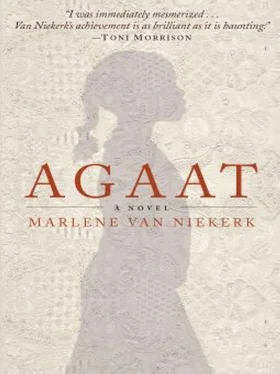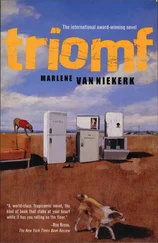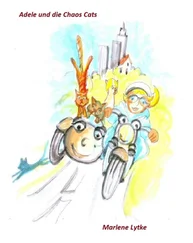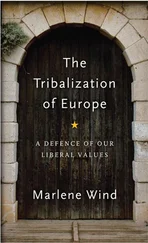Onward, onward, ever onward, by forest and by foam, ever shall we wander, ever shall we roam.
I can see it in her face. Shift-boss habits. She taps the beat on the railing of the bed. Then the words come.
Don’t shirk! There’s a nation to lead, there’s a war-cry to heed, there’s work! There’s no glory or fame, there’s no compromise tame, there’s but following the hot bright flame. Come on!
If I have managed to produce something, an exposition, complete with nevertheless and notwithstanding, it’s my turn to exert pressure. Then she must reply. It’s only common decency, her responding, I spelt out for her. But she often remains quiet. Or she says, next sentence please. Or she shrugs her shoulders, which means, you answer it yourself. Or she puts down the duster and walks out. Or she looks at me until I shut my eyes.
Put in a bookmark, she says then, then we can remember where we were, this is one of your long stories again, and I can’t see how it’s to end.
I was alone, I felt useless, I wanted to do something for my fellow humans.
She goes to stand by the stoep door and looks out. Or she takes up after a while where we left off, and leaves me talking to myself.
I did not realise what a big responsibility it would be, I did not think far enough.
Just go ahead and forget that I’m here, her face says, I just spell out everything for you and say it out loud so that you can hear what you sound like.
Jak was always against it and I resisted him, for years I resisted him but the pressure was too great and then I gave in.
She can’t always keep her voice neutral. She charges my sentences with her own resonances. Disbelief, emphasis, mockery. She adds on and improvises. To my own ears I sound like running commentary rather than original intention.
Do something for your fellow humans? Or do something with your fellow humans or to your fellow humans? Fellow human or in- or superhuman? Or half human? Less human than yourself?
Sometimes when we’ve completed a sentence, she doesn’t repeat it at all, so that I lose my thread amongst stray words.
Sorry. Powerless. Guilty. I am. I shall be. But. How am I to. Die. Question mark.
Then she changes the subject. Or she says, for heaven’s sake get to the point, Ounooi, you’re much too long-winded again today.
As if there were endless days extending before me. As if tomorrow could be much different for me from today.
It takes so much time, this business. Clarity is not guaranteed. It causes misunderstandings instead, that we then laboriously have to clear up again. The tapping and winking and spelling is harder on my eyes than the splint ever was heavy on my hand. Her prefabricated phrases block me rather than help me, my language feels like a brutal instrument with which I’m torturing myself. How long will I still be able to blink my eyes? The left wants to droop shut, the right opens wider than I’m used to. If my eyelids freeze, that’s the end.
The chance, I’m getting a last chance. Perhaps I should rather associate freely than try to explain point by point, let her see who I’ve become in the meantime, here speechless on my bed, delirious, yearning, a poet of losses, a teller of legends.
The task weighs more heavily on my mind than the writing of my last words when I could still write. It’s more momentous than the making of my inventories for the clearing-out, my will, my self-determination codicil.
It’s more difficult than any last wish. It causes complications at a stage when she, and I, had hoped that things would become easier. Now the close will be more difficult than either of us could ever have predicted.
I can understand very well that she wants to keep the talking within limits, has established a fixed structure for it. She keeps us to it strictly. One hour in the morning, one hour in the evening.
Before she goes to bed, I’m granted another few sentences, if she feels the need herself, when she’s done reading from the blue booklets, the last parcel from the sideboard, the first lot that I filled with my writing, without abbreviations, full particulars with the explicitness of the beginner.
She took a long time to remove the string with which it was still bound. The first few days that it was lying here, she fiddled with the knot a few times, but then let it be again. At length she snipped it off with her scissors and started reading in a whispered intake of breath, as if she wanted to vacuum the words.
When she’s had enough, then she gets up, then she takes the duster. Then I know it helps her to talk to me, but mostly about trivialities. Harmless.
It helps her to believe that I’m harmless. She even wants to believe in my goodness, it seems to me. But then I have to be potent as well, because what would virtue be for Agaat without power?
That’s something she can’t tolerate.
If on the other hand, as happens on some days, she makes me out to be entirely bad, then she feels that she’s bad herself. And that she doesn’t want to be. That she can’t be. Her name is Good.
Would it be good to forgive me? It would be too easy. And it would solve nothing.
Would it be good to take revenge? It’s been a long time since that satisfied her, avenging yourself on a helpless victim is not interesting.
How can I help her?
Too many sentences to spell out. I must keep my text simple. I can’t tell her story on her behalf, and if she’s too tongue-tied and has too little pride to do it herself, then it’s not my fault.
How many Jerseys do you now have in your herd? That I’m allowed to ask. How many heifers are you going to sell in autumn? What’s your price? What does the market look like? She supplies the figures.
If you carry on like this, you’re going to be a rich farmer one day, I’m allowed to say.
What good is it going to do me? her face asks then. When she sees that I’ve caught her out in self-pity, she backtracks quickly. As with the tirade yesterday.
Yes, I just have to give, give, give nowadays to keep the labourers happy. The creatures of late seem to want to guzzle and guts, even steal the dogs’ food out of their bowls around the back. Before you fell ill they were still happy with flour and coffee and now and again their smoked pork and their sack of beans and onions and pumpkins. But no, now it’s a sheep a month on top of it, and then I have to provide for the women and children as well, if the one isn’t suffering from this, then the other complains of that. They eat you out of house and home and they’re too lazy to work, they just want to lie in their hovels. I told Dawid a long time ago the whole lot must go, I want casual labourers, or better still, I get in a team of Transkei kaffirs every now and again, they’re happy anyway with mealie-meal porridge and sour milk.
I said nothing in reply. And she knew why.
In the silence that followed, she took up her embroidery and sat working wordlessly for two hours. That’s the way it often goes since we’ve been able to talk, as if she’s trying to gather strength for the next conversation.
She’s sitting just too far away for me to see what’s she’s doing there on her cloth.
She’ll show me when she’s done, she says.
Apparently it contains all the stitches in the book.
Diagonal ripple-stitch, odd wave-stitch, step-stitch, honeycomb-stitch, blanket-stitch, hemstitch, paving-stitch, wreath-stitch.
There’s still a lot to fill in, she says, filling-in patterns for drawn-fabric work, sheaves, ears of corn, stars, eyelets, flowers, diamonds, wheels, shadow-blocks.
Some parts she has to unpick and redo, though much smaller, otherwise not everything fits in so well. It takes much longer than she thought to get everything in place, she says.
Читать дальше












